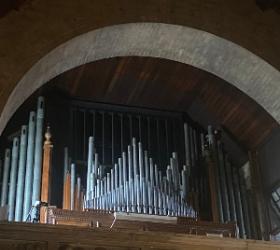
Guilty Pleasures: Reading, Listening, and Viewing
Recreational reading and several reissued recordings from the middle of the 20th century are recommended for pleasure, guilty or innocent:
The Soprano Wore Falsettos by Mark Schweizer (Hopkinsville, KY: St. James Music Press, 2006; ISBN 0-9721211-6-1)
The fourth in Schweizer’s madcap series of liturgical mysteries regales readers with another adroit mingling of a Raymond Chandleresque typewritten tale presented within the story of churchly shenanigans at St. Barnabas Episcopal Church in St. Germaine, North Carolina.
The current volume includes shoe polishing for Maundy Thursday (a contemporary worship successor to traditional foot washing); a Pirate Eucharist in which “Arrgh! Alleluia’s” abound; a restaurant called Buxtehooters; references to compositions by Scarlatti, Rachmaninov, Mozart, Fauré, Froberger, Beethoven, and Casals, with German beer, Fräuleins, AND a three-manual Flentrop organ [page 112!] for “local” color. Not to be overlooked is a fortuitously named character, the substitute organist Mrs. Agnes Day. Highly recommended for readers struggling with the demands of the Lenten season. And others.
Choices: A Novel by Paul Wolfe (Santa Fe: Sunstone Press, 2006; ISBN 0-86534-485-X) (telephone: 800/243-5644 for orders).
During several conversations with the author of Choices, he described his forthcoming book as “Jane Austen with sex,” and this entertainingly wicked publication delivers on this promise. Wolfe’s story is set in Italy, primarily at the international music festival of “Lospello,” where devoted manager Ricardo Ricci keeps things on an even keel. Keeping a relationship with his longtime companion and love Katherine presents the other major challenge of Ricardo’s life. Adding George, a young and comely narcissist, to the festival’s management staff stirs the erotic mix to boiling, and beyond. Sly commentaries on the music festival scene vie with various steamy couplings to keep readers turning the pages. A harpsichordist, the fresh toy for the festival’s maestro Gianfranco Connery, makes a timely appearance [page 368]. Recommended for mature readers only.
Paul Wolfe, Texas born, studied harpsichord with Wanda Landowska together with compadre Rafael Puyana from 1955 until Madame’s death in 1959. During these years he recorded a number of solo harpsichord discs for the Experiences Anonymes label. A few years later, upon the closing of the recording company, these tapes were purchased by Lyrichord Records. Wolfe’s discs, offering splendid playing on an early, pre-Landowska-model Pleyel harpsichord and on his Rutkowski and Robinette nine-foot instrument with sub-unison stop, have been reissued by Lyrichord in two compact disc albums entitled When They Had Pedals, comprising works by Frescobaldi along with English keyboard music from the Tudor Age to the Restoration [LEMS-8033] and six Handel Suites (numbers 3, 8, 11, 13, 14, and 15) [LEMS-8034].
By the legendary Landowska herself, two recordings from her American years have been combined in one compact disc for the Testament label (SBT 1380): Wanda Landowska: Dances of Poland and A Treasury of Harpsichord Music. Originally entitledLandowska Plays for Paderewski (the noted pianist was, late in life, prime minister of Poland), Landowska’s program includes a wide-ranging variety of unusual pieces: short works by Michal Kleofas Oginski, Jacob le Polonais, Diomedes Cato, Landowska herself, and the iconic national composer Fryderyk Chopin (Mazurka in C, opus 56, number 2). If there were ever any doubt about the harpsichordist’s Polish roots, her magisterial rhythmic control in these essential ethnic offerings would squelch any possible argument to the contrary.
Not the least part of the enjoyment provided by this compilation comes from new and original comments in an essay by British harpsichordist Jane Clark. She presents a fresh perspective on two selections by Rameau (Air grave pour les deux Polonois) and François Couperin (Air dans le goût Polonois), noting that the 18th-century French did not think highly of their neighbor nation’s chivalric etiquette, thus suggesting that these short pieces might be satirical rather than adulatory.
The second program on this disc was issued originally in 1957 as a collection of short works recorded at various venues during the year 1946. Highlights include Couperin’s Les Barricades Mistérieuses and L’Arlequine, Handel’s “Harmonious Blacksmith” Variations from the Great Suite in E Major, two welcome Mozart miniatures, plus the longer Rondo in D, K. 485 (splendid reminders of Landowska’s lovely way with the Salzburg master, more often played by her on the piano than the harpsichord), and ending with a signature performance of Bach’s Vivaldi arrangement (Concerto in D, BWV 972), at the end of which, loathe to depart, she iterates again and again, in descending registers, the third movement’s signature motive—an idiosyncratic and unforgettable addition to Bach’s transcription.
Viewing Landowska: Uncommon Visionary, a 57-minute documentary by Barbara Attie, Janet Goldwater, and Diane Pontius first issued on video tape in 1997, should be required of all who prize the harpsichord revival. Now available in DVD format (VAI DVD 4246), the new issue has more than 50 minutes of additional material, including all the extant footage of Landowska playing the harpsichord, and an audio-only reissue of her November 1933 first recording of Bach’s Goldberg Variations (made in Paris). The reminiscences from several now-departed major figures who knew Landowska intimately—especially her longtime companion Denise Restout; friend, Polish singer Doda Conrad; and recording engineer John Pfeiffer—are irreplaceable and especially illuminating as the great 20th-century harpsichordist’s life recedes ever further into history. It is delightful, as well, to see some younger images of other commentators in the documentary—Alice Cash, Skip Sempé, Willard Martin, and, yes, this writer—as we appeared and sounded in the waning years of the past millennium. But the major impact of this video disc stems from Landowska’s inimitable playing, reminding us again and again why she became (and, for many, remains) the preferred exponent of that strange and wonderful instrument she toiled so assiduously to revive, THE HARPSICHORD.
Send news items or comments about Harpsichord News to Dr. Larry Palmer, Division of Music, Southern Methodist University, Dallas, TX 75275;




